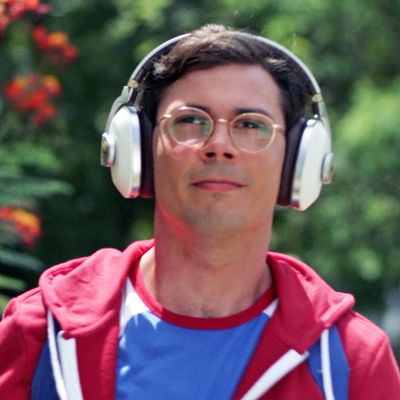
There are lots of stand-out scenes in Special, a new, significantly autobiographical Netflix show by Ryan O’Connell. There’s one of the most frank depictions of gay sex on TV in a good long while, and probably the first-ever TV sex scene between a disabled man (O’Connell, who has cerebral palsy) and a friendly, cheerful gay sex worker. There’s also the scene where Ryan (O’Connell’s name is also his character’s name) struggles futilely to tie his new shoes, ends up tucking the laces into the sides, and then has to cope with the humiliating awkwardness of his friend tying them for him. There’s the scene where Ryan finds himself Googling “internalized ableism.” There are also all of the conversations with his mother, which circle through loving support, self-centeredness, condescension, and back and forth codependence before winding their way back to love.
Special is full of these moments, little exchanges and relationships that would feel like important breakout points of conversation on a bulkier, slower show. But Special is an eight-episode Netflix season where each episode runs about 15 minutes, so it feels absolutely, unsparingly lean, pared down to the point that every single scene is there because it’s proven its worth and necessity. As a result, pulling out any one scene as especially noteworthy feels a little disingenuous. Yes, it’s remarkable and unusual to watch a gay disabled man have a conversation with his co-worker, a plus-size woman of color (Kim, played by Punam Patel), about how their employer makes them mine their identities for exploitative first-person essays built to go viral. But calling that scene a standout doesn’t seem right — in order to stand out it needs to feel different from the rest of the show. It doesn’t because nearly all of Special is like that.
The series is about Ryan’s first major steps away from his mother and toward a career. He’s gotten an internship at a website called Eggwoke, a loose adaptation of O’Connell’s own postcollege days as a writer for Thought Catalog. His boss (Olivia, played by Marla Mindelle) is a horrible, humorless monster who would be happy about pushing her employees to turn their trauma into clicks, except that she is not capable of feeling happiness. His mother, Karen (Jessica Hecht), cannot decide if she wants to be overbearing or dismissive; she’s caught between resenting Ryan for consuming so much of her adult life and being afraid to let him go. And at the center, there’s Ryan, who carries the series by being funny and compelling, and impressively committed to depicting his own imperfections.
The downside of the 15-minute format is that Special can feel thin; its episodes sometimes feel more like extended punch lines than fully developed stories. Of the small main cast, the only characters given enough space to be complicated, fully wrought people are Ryan and Karen (with the possible addition of Kim, who has a few moments of honest complexity but whose inner life never approaches Ryan’s). The world of Special is also small: There’s where Karen and Ryan live, there’s the Eggwoke offices, and there are some scattered, featureless restaurants and pools. It’s not really a problem because Special’s economical world-building doesn’t interfere with its characterization — if anything, it probably helps that Ryan and his mother are generally trapped together in a small kitchen or bedroom (or, memorably, in a bathroom). But it does mean that you could mistake all of Special for being small and easily digestible, and that would be a disservice to how well O’Connell’s Ryan resists being enclosed into simple, reductive categories.
The series works because O’Connell makes it work, and because most of its energy is directed toward depicting how spiky and caustic Ryan can be, while also being vulnerable and sheltered and myopic and intelligent. His flaws are O’Connell’s flaws, right down to the decision to lie about his cerebral palsy to his co-workers because it lets him escape the stigma of a congenital disability. Just as O’Connell did, as he details in his 2015 book I’m Special, and Other Lies We Tell Ourselves, Ryan tells his new co-workers that his disability was caused by being hit by a car. It is freeing — they are sympathetic, and find it easier to relate to him — right up until the moment it’s no longer freeing and starts to feel like a trap instead. And Special is impressively matter-of-fact about it. It does not excuse Ryan’s behavior, and is especially careful not to sugarcoat his codependence with his mother. But those less flattering elements are all just parts of who Ryan is. He’s thoughtless and occasionally cruel; he’s a human being.
In an interview with Vulture, O’Connell talks about how much he wanted the show to be a half-hour, and how he’d push for Special to have half-hour episodes in the future. (“Honey, I don’t go chasing 15-minute waterfalls. I stick to the rivers and lakes that I’m used to, and that is a 30-minute show, okay?”) If Netflix does pick up the show for a second season, which it really should, it will be fascinating to see how O’Connell goes about expanding the world of the show. Right now, Special feels introspective and gutsy and brief, not unlike a really funny, well-made version of one of Ryan’s first-person essays for Eggwoke. With a full half-hour and a bigger budget, Special could go from being a great if slightly-too-scant story to something really magical.
Want to know what’s new on Netflix? Check out Vulture’s streaming guide.


